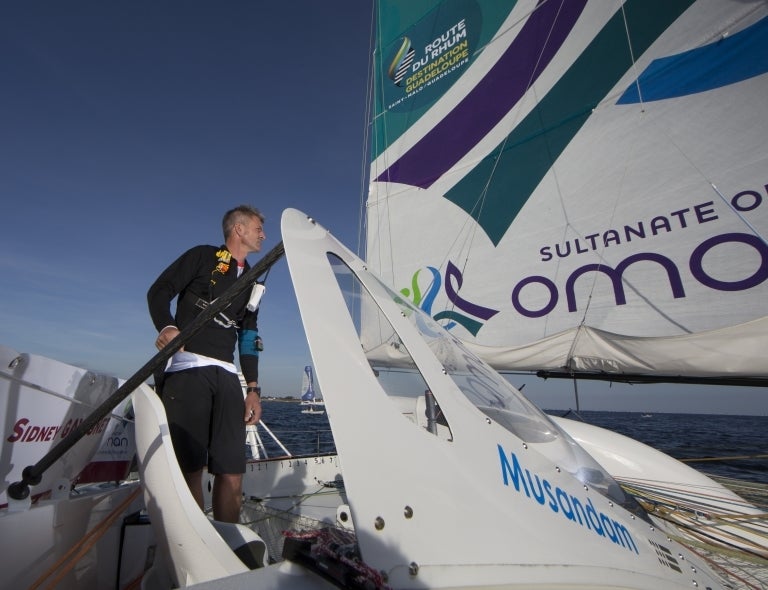Yoga and onions calm alarm bells for Atlantic warriors
Gavignet and veteran Sir Robin target successful test in Route du Rhum

Sidney Gavignet has “six or seven” alarms to keep him safe while crossing the Atlantic on the 3,500-mile Route du Rhum race from piratical St. Malo in Brittany to Guadeloupe in the French West Indies. Thirty years his senior, at 75, Sir Robin Knox-Johnston has two, and one of those is a permanent sixth sense feel for what the boat is doing.
The other is a simple wake-up alarm which he can set for anything up to 99 minutes, while Gavignet never allows more than 20 minutes before being invited to check what is going on. Changes in the weather or conditions, even incoming e-mails also trigger an interruption, but, then, Gavignet has calculated that there is a 50 per cent. chance of his 70-foot trimaran, Musandam-Oman Sail, capsizing.
“I don’t like those odds,” says Sir Robin, who prefers the 60-foot monohull which he has named Grey Power, to sail itself as much as possible. Both men are in a fleet of 91 singlehanded boats which set off on Sunday, cheered by hundreds of thousands ashore and the focus of over a million visitors to the 10 running of a bi-ennial sailing event that captures as much public attention as the four-yearly Vendée Globe singlehanded round the world race from Les Sables d’Olonne, further south on France’s Atlantic coast.
Gavignet has abandoned the weight-lifting and gymnasium-based approach to race preparation, opting instead for just 12 days of solo training at sea and relying instead on up to three sessions of yoga a day, sometimes starting at 05.30, to counter some earlier doubts about whether he should do the race at all. “I felt that yoga would be interesting and I am feeling lucky that the race exists and that Oman has decided to do it,” he says. “On the delivery back from the round Britain race to Lorient earlier this year we were a bit overpowered and I got scared, wondering how I could handle so much power.
“Now, I am happy in my mind and comfortable on the boat. Stress is really bad but I am feeling good with my machine.” Sir Robin is not. He has a problem with the onboard Iridium telephone which not only keeps him in touch with the rest of the world but has to work if he is to be allowed to cross the start line. “They are a bunch of amateurs,” he says of the supply company. “And then they try to blame me. If car reliability was the same as computers we would still be riding horses,” he says. “I’ve bought it and fitted it so why isn’t it working? It means I am running around wasting my time trying to sort out the failures of the electronics industry.”
He brushes aside the constant references to his age. “Inside, we are still the young people we were and, when it comes to public reaction to what I am doing, I don’t care what other people think and rarely have.”
Both say that, first and foremost, they just want to complete the course in one piece. Sir Robin, who admits to large doses of self-indulgence in deciding to take part, is under no pressure from sponsors and only sees his participation as a vague crusade to say that retirement age can also be “incredibly active.” And, as founder of the Clipper Race, which allows paying competitors to sail around the world, he also wants to see more French participation.
Gavignet is the senior sailor in an Omani initiative that combines using sport as part of a youth development programme with promoting the sultanate as a tourist destination, especially in France.
And both are expecting to play it carefully, especially over the first 24 to 30 hours as they cross the Bay of Biscay to Cape Finisterre. Shipping lanes, fishing boats, and what could be bouncy conditions will be alarm enough to ensure that sleep is at a minimum but fatigue is also a danger which can lead to mistakes.
After that, a new, longer-striding rhythm can be developed and Gavignet is sure that a new record will be set, not least because of a number of giant multihulls is taking part. Gavignet will leave the return trip to a delivery crew; it may mean that, not only will he have made time available to help elder of his two daughters, 16-year old Chade, start the new school year but may even be around for the turn of the year festivities. His second daughter Tarajune is also in St. Malo to wish him well.
Sir Robin won’t be bringing the boat back either. It stays in Point à Pitre and will be picked up next year for a race from Newport, Rhode Island, to Cowes. He will have a crew of friends, the first of which is India’s first man to sail solo around the world, Dilip Donde. It was being the first man to do that when winning the Golden Globe Race in 1968-69 which catapulted the former merchant navy officer, Sir Robin, to fame.
And will he be eating freeze-dried food on his trip across the Atlantic. “Yes, but it will be augmented,” he says, “with chopped up fresh onions.” And how about an evening snifter? “I’ll take the fifth on that,” he adds.
Join our commenting forum
Join thought-provoking conversations, follow other Independent readers and see their replies
Comments
Bookmark popover
Removed from bookmarks